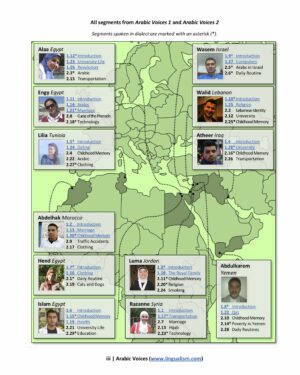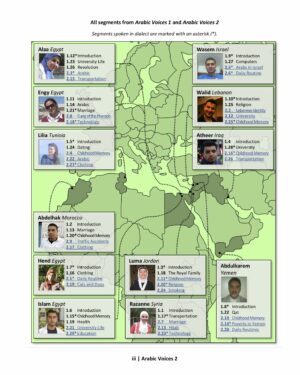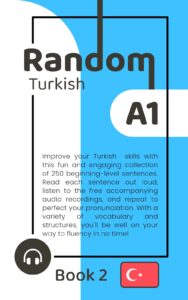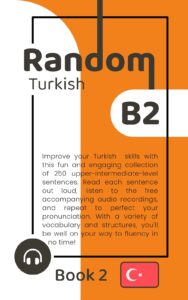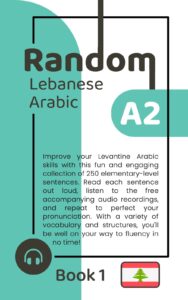Home » Modern Standard Arabic » Transportation–Atheer
Transportation–Atheer
| Peace, mercy and blessings of God, [00:00.7] | السلام عليكم ورحمة الله وبركاته، | |
| Hello and welcome to another Arabic Voices video. [00:03.7] | أهلًا ومرحبًا بكم في فيديو آخر من فيديوهات Arabic Voices. | |
| Today we will talk about what Atheer said about transportation in Iraq, and we will comment on the different words and phrases she used. [00:08.4] | اليوم سنتحدّث عمّا قالته أثير بشأن المواصلات في العراق، وسنعلّق على ما استخدمته من كلماتٍ وعباراتٍ مختلفة. | |
| We start on page 150, specifically on line 3, where Atheer begins her speech by saying: (Generally on a personal level, most people use their cars). [00:18.2] | ونبدأ في الصفحة مائة وخمسون، وتحديدًا في السطر الثالث، حيث تبدأ أثير حديثها بقولها: (عمومًا على المستوى الشخصي فأكثر الناس تستعمل سياراتها). | |
| And [generally] you can use it at the beginning of a speech to generalize or to say that something is often happening. [00:31.1] | و[عمومًا] يمكنك أن تستخدمها عند بداية الكلام للتعميم أو لذكر أنه في الغالب يحدث أمرٌ ما. | |
| You can also start by saying [generally], (generally on a personal level, most people use their own cars) or (generally on a personal level, most people use their own cars); [generally] or [generally] in one sense. [00:39.6] | كما يمكنك أن تبدأ كذلك بقولك [عامة ً]، (عمومًا على المستوى الشخصي فأكثر الناس تستعمل سياراتها الخاصة) أو (عامةً على المستوى الشخصي الشخصي فأكثر الناس تستعمل سياراتها الخاصة)؛ [عمومًا] أو [عامةً] بمعنّا واحد. | |
| After that, we move to line 6. And we remind you of something we had mentioned before—we used to say that the verb [restricted] must be accompanied by the word [on], (restricted to something). [01:00.3] | بعد ذلك ننتقل إلى السطر السادس—ونذكركم بشيءٍ كنا قد ذكرناه من قبل—كنا نقول أن الفعل [يقتصر] لا بدّ وأن يحلق بكلمة [على]، (يقتصر على أمرٍ ما). | |
| Here, Atheer says: (As for the use of bicycles, it is limited to certain times) that is, it is specific to certain times; [Limited to]. [01:16.9] | وهنا تقول أثير: (أما بالنسبة لاستعمال الدراجات الهوائية، فإنه مقتصرٌ على أوقات معينة) أي يختص بأوقات معينة؛ [يقتصر على]. | |
| And [on] must be used with this verb, and here another form is used, not the verb, but [on] must also be used with this word. [01:30.5] | ولابدّ من استخدام [على] مع هذا الفعل، وهنا تستخدم صيغة أخرى وليس الفعل، ولكن لابدّ كذلك من استخدام [على] مع هذه الكلمة. | |
| We then move on to line 9. Atheer says: (and may contain screens for displaying video at times," and also with the verb [contains] we use the word [on], [contains]. [01:41.6] | ننتقل بعد ذلك إلى السطر التاسع—تقول أثير: (وقد تحتوي على شاشات لعرض الفيديو في بعض الأحيان)، وكذلك مع الفعل [يحتوي] نستخدم كلمة [على]، [يحتوي على]. | |
| We say: (This book contains a lot of information," which means [includes]; You can say (contain) or (include). [01:57.4] | نقول: (هذا الكتاب يحتوي علىمعلومات كثيرة)، وهذا يعني [يتضمن]؛ يمكنك أن تقول (يحتوي على) أو (يتضمن). | |
| (This book contains a lot of information) or (it contains a lot of information," both are correct, but you must use [on] with the verb [contain]. [02:06.1] | (هذا الكتاب يحتوي على معلوماتٍ كثيرة) أو (يتضمن معلومات كثيرة)، كلاهما صحيح، ولكن لابدّ من استخدام [على] مع الفعل [يحتوي]. | |
| After that, we move to line 11, where Atheer says: (But if you want to go to Baghdad, the options are more, in addition to the options below). [02:17.2] | بعد ذلك ننتقل إلى السطر الحادي عشر، حيث تقول أثير: (أما إذا أردت أن تذهب إلى بغداد، فالخيارات تكون أكثر، بالإضافة إلى الخيارات أدناه). | |
| [plus] this phrase is used when you want to add something, you can use [plus], you can use [next to], you can use [along]; Any of these statements is true. [02:32.0] | [بالإضافة إلى] وهذه العبارة تُستخدم عندما تريد أن تضيف أمرٍ ما، يمكنك أن تستخدم [بالإضافة إلى]، يمكنك أن تستخدم [بجانب]، يمكنك أن تستخدم [إلى جانب]؛ أيًا من هذه العبارات يكون صحيحًا. | |
| You can say: (To go... but if you want to go to Baghdad, the options are more next to the options below; besides the options below) Which of these statements is true to add. [02:47.1] | يمكنك أن تقول: (أن تذهب… أما إذا أردت أن تذهب إلى بغداد، فالخيارات تكون أكثر بجانب الخيارات أدناه؛ إلى جانب الخيارات أدناه) أيًا من هذه العبارات يكون صحيحًا للإضافة. | |
| Then we move to line 15—Atheer says: (Also this option is likely if you are traveling to northern Iraq," and the word [likely] here means that this option is the best, that this option is the best. [03:05.0] | بعد ذلك ننتقل السطر الخامس عشر—يقول أثير: (أيضًا هذا الخيار هو المرجح إذا كنت مسافرًا إلى شمال العراق)، وكلمة [مرجح] هنا تعني أن هذا الخيار هو الأفضل، أن هذا الخيار هو الأمثل. | |
| You can say in this phrase: (This is the best option if you are traveling to northern Iraq, this option is the best if you are traveling to northern Iraq) [optimal, best, likely] in one sense, you use them when you want someone's advice, by doing something. [03:24.9] | يمكنك أن تقول في هذه العبارة: (إن هذا الخيار هو الأمثل إذا كنت مسافرًا إلى شمال العراق، إن هذا الخيار هو الأفضل إذا كنت مسافرًا إلى شمال العراق)، [فالأمثل، الأفضل، المرجح] بمعنّا واحد، تستخدمهما عندما تريد نصيحة شخصٍ ما، بفعل شيءٍ ما. | |
| She says: (This book is the most likely book for studying Arabic, this book is the best for studying Arabic, this book is the best for studying Arabic," and so on. [03:48.5] | تقول: (إن هذا الكتاب هو المرجح لدراسة العربية، إن هذا الكتاب هو الأفضل لدراسة العربية، إن هذا الكتاب هو الأمثل لدراسة العربية)، وهكذا. | |
| After that we move to line 18—Atheer says here: (I think it is necessary that there be development in more than one direction in the means of transportation). [04:01.1] | بعد ذلك ننتقل إلى السطر الثامن عشر—تقولأثير هنا: (أعتقد أنه من الضروري أن تكون هناك تنمية في أكثر من اتجاه في وسائل النقل). | |
| Here, Atheer says [it is necessary], that is, she thinks this is something to be done. [04:18.6] | وهنا تقول أثير [من الضروري]، أي أنها تعتقد أن هذا أمر يجب فعله. | |
| And when you think that something must be done, you can say [that it is necessary], you can say [that it is necessary], you can say [that it is necessary]. [04:25.9] | وعندما تعتقد أن أمرًا ما يجب فعله، يمكنك أن تقول [أنه من الضروري]، يمكنك أن تقول [أنه من اللازم]، يمكنك أن تقول [أنه من الواجب]. | |
| In this phrase, she says, for example: (I think that there must be development, I think that there must be development, I think that there must be development). [04:37.2] | ففي هذه العبارة تقول مثلًا: (أعتقد أنه من الضروري أن تكون هناك تنمية، أعتقد أنه من اللازم أن تكون هناك تنمية، أعتقد أنه من الواجب أن تكون هناك تنمية). | |
| You can say (I think it is necessary to make a change in ... in the means of administration, I think it is necessary to make a change, I think it is necessary to make a change); [It is necessary, it is necessary, it is necessary] Each… either means the same thing. [04:51.9] | يمكنك أن تقول (أعتقد أنه من الضروري أن نقوم بتغيير في ف… في وسائل الإدارة، أعتقد أنه من اللازم أن نقوم بتغيير، أعتقد أنه من الواجب أن نقوم بتغيير)؛ [من الضروري، من اللازم، من الواجب] كل… أيًا منهما يعني نفس الأمر. | |
| We then move on to line 20, where Atheer says: (My experience with transportation is mostly driving my own car to a place… to the place I intend to go to). [05:13.7] | ننتقل بعد ذلك إلى السطر العشرون، حيث تقول أثير: (خبرتي مع النقل أكثرها بقيادة سيارتي الخاصة إلى مكان… إلى المكان الذي أنوي الذهاب إليه). | |
| Here we quickly point out that the verb [intends] is like the verbs we have mentioned before, followed by the infinitive, whether it is the explicit source or the responsible source. [05:28.4] | وهنا نشير سريعًا إلى أن الفعل [أنوي] مثله مثل أفعال كنا قد ذكرناها من قبل، يليه المصدر، سواء ما كان المصدر الصريح أو المصدر المؤول. | |
| (I intend to go to a country) or (I intend to go to a country," (I intend to leave the house," or (I intend to leave the house) We add this verb in the infinitive, whether the explicit source or the responsible source. [05:43.3] | (أنا أنوي الذهاب إلى بلد) أو (أنوي أن أذهب إلى بلدٍ ما)، (أنا أنوي الخروج من المنزل)، أو (أنوي أن أخرج من المنزل) نلحق هذا الفعل في المصدر سواء المصدر الصريح أو المصدر المؤول. | |
| We then move on—and finally—to line 21, where Atheer says: (It may happen that I take a taxi, at least to avoid getting tired on the road, and to have time to sleep or read on the road). [05:59.3] | ننتقل بعد ذلك—وأخيرًا—إلى السطر الواحد والعشرين، حيث تقول أثير: (وقد يحدث أن آخذ سيارة أجرة، على الأقل لكي أتجنب تعب الطريق، وليسنح ليّالوقت بالنوم أو القراءة بالطريق). | |
| This phrase [I have time] means that it is possible for me to do something. [06:17.0] | وهذه العبارة [يسنح ليّ الوقت] أي أنه يكون في الإمكان أن أفعل شيء ما. | |
| You can say [time permits] with a nun, or you can say [time permits] with a meme; Either of these two statements is correct. [06:26.5] | يمكنك أن تقول [يسنح ليّ الوقت] بالنون، أو يمكنك أن تقول [يسمح ليّ الوقت] بالميم؛ أيٍ من هاتين العبارتين تكون صحيحة. | |
| She says: “I have time to hold or stay in the library for a long time,” or she says, “I will have time to stay in the library for a long time.” [06:39.5] | تقول: (سمح ليّ الوقت أن أمكس أو أن أبقى في المكتبة لمدة طويلة) أو تقول: (سنح ليّ الوقت أن أبقى في المكتبة لمدة طويلة). | |
| We also say [the opportunity arises] or [the opportunity permits], and we mean it soon. [06:52.4] | كما كذلك نقول [تسنح الفرصة] أو [تسمح الفرصة] وهي بمعنّا قريب. | |
| (I had the opportunity to see many places before I left the country, I had the opportunity to see many places before I left the country); [We will allow] In this context, either of them can be used with the same meaning, that is, in the sense of availability and possibility. [06:59.7] | (لقد سمحت ليّ الفرصة أن أرى أماكن كثيرة قبل أن أغادر البلد، لقد سنحت ليّ الفرصة أن أرى أماكن كثيرة قبل أن أغادر البلد)؛ [فسنح وسمح] في هذا السياق يمكن استخدام أيًا منهما بمعنّا واحد، أي بمعنى الإتاحة والإمكان. | |
| With this, we have finished commenting on what Atheer said about transportation in Iraq. [07:23.2] | وبهذا نكون قد انتهينا من التعليق على ما قالته أثير بشأن المواصلات في العراق. | |
| I hope you have benefited from this video. [07:30.2] | أتمنى أن تكونوا قد استفدتم من هذا الفيديو. | |
| Thank you very much. May the peace, mercy and blessings of God be upon you. [07:32.6] | أشكركم شكرًا جزيلًا، والسلام عليكم ورحمة الله وبركاته. |
Video Lessons
Arabic Voices MSA Lessons
Arabic teacher Mostafa Ahmed takes us through segments in MSA from Lingualism's book Arabic Voices 1: Authentic Listening and Reading Practice in Modern Standard Arabic and Colloquial Dialects, explaining interesting points of grammar and vocabulary.
© 2024 Lingualism LLC


